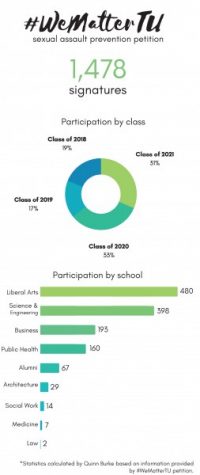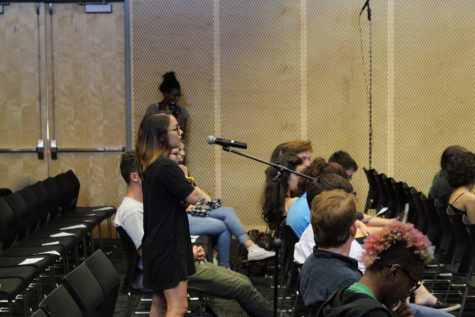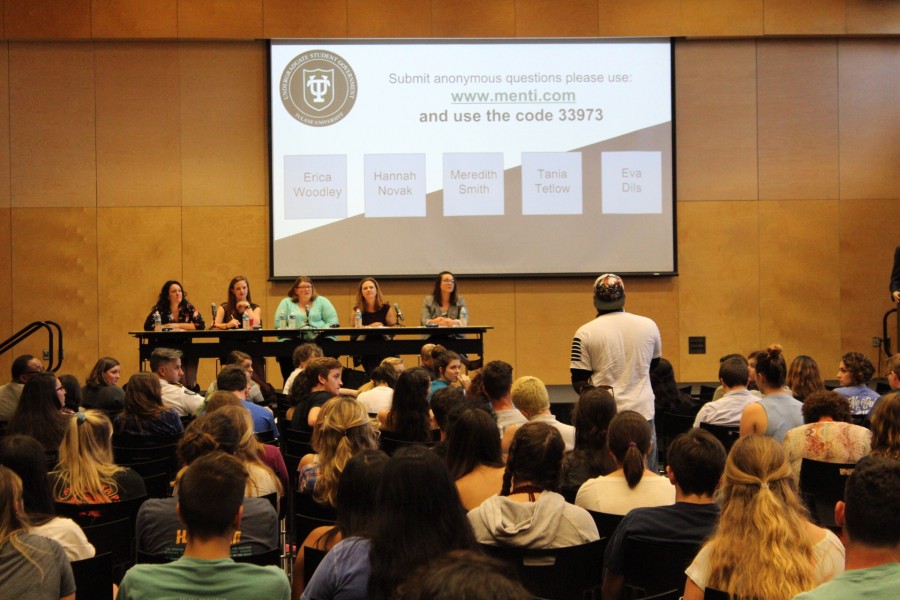Students push for representation in sexual assault prevention efforts
Josh Jessiman | Contributing Photographer
Community members gathered to ask a panel of students and administrators questions about university-led efforts to combat sexual assault at a town hall Tuesday in Kendall Cram.

Driven by unmet promises from the university administration, students from many corners of Tulane’s campus came together to create the #WeMatterTU petition, urging the release of the Climate Survey data alongside a set of demands concerning administrative action on sexual misconduct.
During the 2016-17 academic year, the Sexual Misconduct Climate Survey was sent out to the student body to gather information on issues of sexual violence on Tulane’s campus. With one of the highest participation rates among universities that administered similar surveys, 47 percent of the Tulane student body completed it.
The administration originally promised to release results from the Climate Survey at the Shifting the Paradigm event on Sept. 19, 2017. Instead, presenters at Shifting the Paradigm announced the results would not be released until Jan. 31, 2018, leaving many students confused about the reasons behind the delay.
“All along, our promise to the Tulane community was to share the data and an action plan for our response,” Meredith Smith, assistant provost for Title IX and Clery compliance, said in a September Hullabaloo article. “In part due to the strong participation rate, we simply need more time to be as comprehensive as possible with both.”
The petition demands administrative action, including addressing the delayed data release and committing to improving student representation in conversations about sexual assault on Tulane’s campus.
“A big piece of this is accountability and transparency,” Josh Rosenbaum, a senior and one of the petition organizers, said. “The administration needs to know that they have to do what we’re asking otherwise this is going to happen again and again, and we’re not looking to slow down. This isn’t a one-time affair.”
The petition was put together by a small group of students in an effort to eliminate sexual violence on campus. As of Tuesday night, when the petition closed, it had been signed by 1,478 members of the Tulane community.
“Student response has been amazing — unified, loud and powerful,” Rosenbaum said. “And I’d say the administrators are listening, and we’ve heard from some of them.”
While the delay of the Climate Survey results drew attention to the issue of sexual violence, discussion about sexual violence at Tulane does not start or end with the survey’s results.
“[The demands] were about radical investment in innovative sexual assault prevention measures on this campus. And that’s what we want the focus to be,” Rosenbaum said. “This is not just about the Climate Survey. This is about creating a campus where students are safe, are valued, don’t have to live in fear.”
When Khristyan Trejo ran for his current position as Undergraduate Student Government vice president of student life last spring, he committed to having USG’s first town hall address sexual violence on campus.
“If administrative officials aren’t creating a space for students to be able to talk about that issue, then I think it’s kind of my job to make sure that I’m doing whatever I can to create that space and start those conversations,” Trejo said.
With organization efforts by Trejo and other USG members, the Sexual Violence Prevention Town Hall was held from 5-7 p.m. on Tuesday in Kendall Cram at the Lavin-Bernick Center for University Life and provided an open forum for students to pose questions to a panel consisting of students and administrators.
With questions coming from both an anonymous online submission platform and students in the room, the event focused on inquiries about the administration’s stance on the petition, a need for better representation of marginalized communities and the imperative of separating the issues of alcohol and sexual assault culture.
One of the first questions was directed at administrators and asked about the administration’s response to the #WeMatterTU petition.

Student Olivia Cooney asks a question during the town hall.
“I think the administration needs to earn the students’ trust …,” Tania Tetlow, senior vice president and chief of staff, said. “I can tell you myself that they are absolutely on the same side as the students and are thrilled to have the petition and the activism that it represents because this is an issue that we are not going to be able to solve without your help, without your ideas.”
Tetlow agreed with the demands of the petition, noting that many of the demands reinforced ideas the administration already supported. She sent an email to the student body on Monday addressing the delayed release of the Climate Survey results and reaffirmed a commitment “to the progress that we’ve made together as a result of our response to the 2011 Dear Colleague Letter.”
The petition calls for concrete measures to ensure students have a more active and equitable role in sexual violence prevention decision-making, such as including more students in the university’s responsive task force. While Tetlow announced the introduction of a webpage for students to anonymously submit their ideas, some still believe there is more to be done.
“I do question the methods being taken in order to engage students on these issues,” Trejo said. “… I think that we need to be taking students more into consideration as [an] advocacy and more of an effective tool as opposed to a focus group that we can get ideas off of.”
The administration also plans to implement a “Blue Ribbon Panel” consisting of national experts to evaluate the university’s sexual violence prevention efforts thus far and identify areas for improvement.
Many students stood up to address the lack of representation of marginalized communities in the efforts to combat sexual assault. Several students asked the panel about including more racially-diverse members in leadership positions and including more men in the discussion.
“I want to make sure that the work that we are doing is becoming more intersectional,” Trejo said. “Whether that’s helping organizations like SAPHE reform their LGBTQ trainings or starting to create a space in which we talk about how marginalized communities are affected by sexual assault and what that looks like at a campus like Tulane.”
Another concern for some students is the language used to discuss the problems of alcohol abuse and sexual violence. According to these students, administrators have used victim-blaming language to suggest causality between alcohol and sexual assault.
“What is the one thing we know that we know about sexual violence?” Rosenbaum said. “[It] is that the victim almost always gets blamed … that link, I think, is problematic.”
In her email to students, Tetlow clarified that “alcohol and drugs do not create rapists or victims,” adding, “they are, however, among the primary tools used to perpetrate sexual assault.” Tetlow expanded on this distinction during the town hall, acknowledging that cultures of alcohol abuse and sexual assault interact but are separate, and language that suggests victim-blaming should not be used.
“It is an excruciating thing to talk about without people wrongly hearing or wanting to blame victims,” Tetlow said. “… it is never true that it is your fault because you’ve been drinking that a violent crime happens to you. It is also not true that alcohol causes people to rape.”
According to some students who have shown their passions for ending sexual violence at Tulane, the fight will not stop with the demands of the petition, and many hope to see a continued conversation along with tangible progress on campus.
“This is about student power more broadly,” Rosenbaum said. “We are right now talking about sexual violence, but this is about the inclusion of student voices in issues and decisions that affect us and that should always exist without us making demands but when it doesn’t we’ll be out there and be loud about it.”
Organizations like Sexual Aggression Peer Hotline and Education, OneWave, Student Health Advisory Committee and Tulane University Peer Health Educators give students channels through which they can join the fight against sexual violence with events like Take Back the Night and SAPHE facilitation.
SAPHE declined a request for comment for this article.
Your donation will support the student journalists of Tulane University. Your contribution will allow us to purchase equipment and cover our annual website hosting costs.



